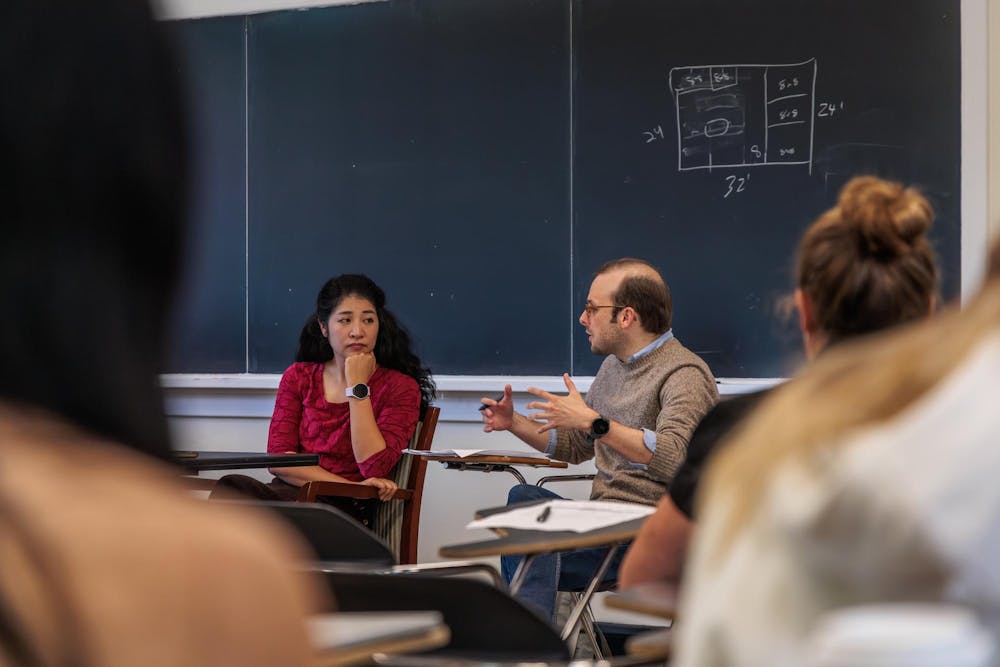Former L.A. Times editors Ada Tseng and Jon Healey travelled from glamorous Los Angeles to Warner Hall Friday morning to discuss their recently released book, “Breaking Into New Hollywood: A Career Guide to a Changing Industry.” The event was hosted by the Department of Media Studies and co-sponsored by the Institute of the Humanities and Global Cultures. For an hour and a half, Tseng and Healey touched on artificial intelligence, entry level positions, networking and more, in addition to taking questions from students present.
Tseng and Healey are both former editors at the Los Angeles Times’ utility desk, which is dedicated to explainers and “how-to” stories. There, they published a “how-to” guide on achieving entertainment industry careers in 2021, detailing the different types of jobs in the industry from pre- to post-production, as well as the qualities and personality traits required for each position.
Over the next few years, the pair transformed the series into a 368-page book, drawing on already published advice as well as new interviews with over 300 industry professionals to create a comprehensive yet grounded guide to breaking into what Hollywood deems “the business.”
“Everyone has their own path. So some people come in and they get their lucky break in their lives,” Tseng said. “But for the most part, it just takes a really long time to sort of build your network, build your skills, and because it's a gig industry, you get a gig and you don't know when you're going to get the next one.”
The co-authors began by discussing where to start in what Tseng labeled a “mysterious industry.” They discussed the appeal of assistant jobs, where the benefits are working with other creatives and gaining an appreciation for all the various departments involved in media production. However, they found it important to note the financial setbacks embedded in the process of navigating a non-traditional field.
“The issue in all of these things is that there's little or no pay, so you have to judge any opportunity based on how much you’re learning, how much you're moving your career forward,” Healey said. “You're really invested in yourself. That's the time that you're not going to get back. It's got to be worth something.”
Writing the book in the wake of COVID-19 and the writers' strikes in 2023, the duo did not shy away from addressing the ever-changing nature of Hollywood, where it can feel daunting to find an entry point. The authors emphasized the importance of jumping in rather than waiting for the perfect moment because there will never be one.
Tseng and Healey advised that the new age of content creation through platforms such as TikTok and YouTube provides an accessible entry point into media production, because ultimately, the most important aspect is developing your skills through whatever you choose to do.
They additionally suggested that through networking with other industry artists, not only do artists establish credentials, but they also begin to develop a community. Tseng and Healey saw this community as essential in navigating the fluctuations of the business, as artists support each other in an industry “always in flux and crisis.”
Before concluding, Tseng and Healy briefly discussed the role of artificial intelligence in the industry, which also served as the topic of the book’s introduction. Healey argued the industry has always been technology-driven, and with each new technological development, some human skills become unnecessary. However, he believes AI will also lead to more efficient spending, therefore creating more projects and subsequently more opportunities for aspiring artists.
The authors encouraged audience comments throughout the panel, so when one of the crowd members suggested Healey’s take on AI was quite optimistic, Healey chuckled and admitted his tendency to believe the benefits will outweigh the harm in the entertainment industry.
“The note of hopefulness about this is that AI tools do lower the barrier of entry into filmmaking, so you could very well have more films being made, which means more work, potentially for more people,” Healey said. “It certainly could be very helpful to writers and directors, people who have film ideas for films, who do not have a budget.”
“Breaking into New Hollywood” is a thorough collection of advice and expertise on joining the world’s most sought-after business, with insights on every aspect of the industry certain to help any aspiring actor, director or sound designer.
“It's such a powerful industry, especially if you are drawn to it because you want to tell a certain story that you don't see,” Tseng said. “I think it’s still something worth striving for.”
For those who are interested, you can order a copy of “Breaking into New Hollywood: A Career Guide to a Changing Industry” here.







